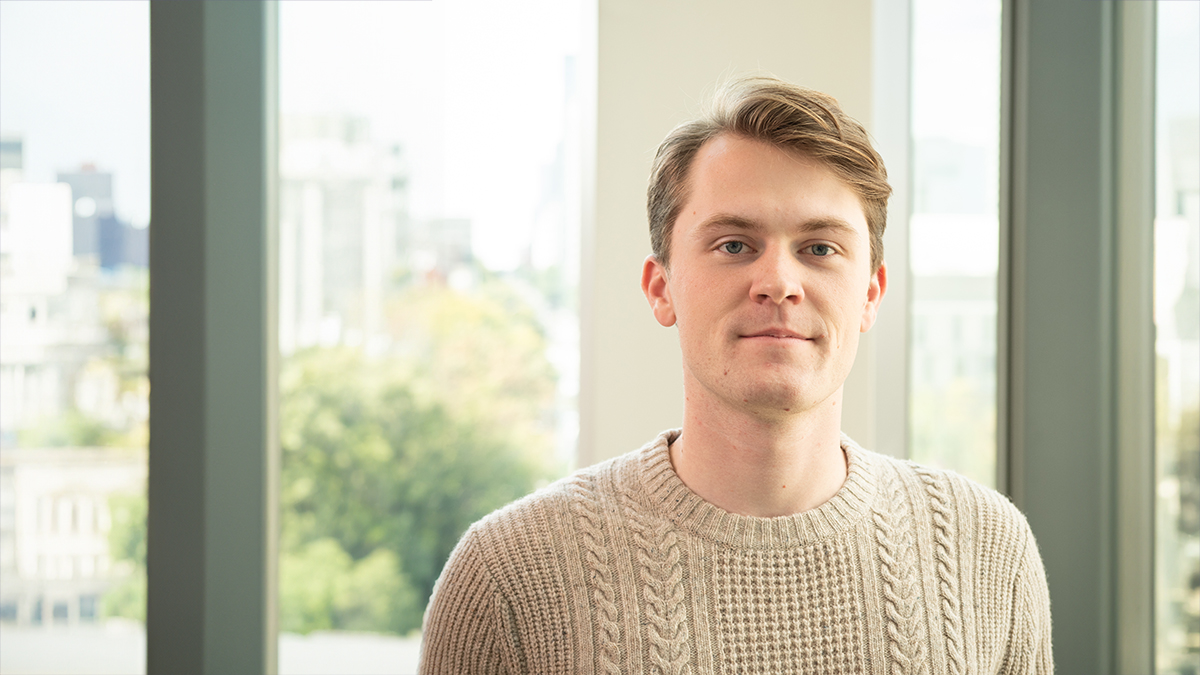
Caleb Fitzpatrick ’24
MS in Economics
For Caleb Fitzpatrick, MS ’24, an interest in economic research came about suddenly and surprisingly.
Fitzpatrick, a Florida native and former youth ice hockey player, became involved in campus activism amid the tumultuous political environment of the late 2010’s. He later founded a nonprofit organization aimed at resolving homelessness and mitigating income inequality in Lynchburg, Virginia, where he attended Liberty University, and investigating the root causes of poverty emerged as his calling in life.
“Amid the conversations I was having with potential funders as the executive director of this nonprofit, I was asking myself if my solutions would help the problem,” he says. “I decided I wanted to become an economist because I wanted to understand the questions so I can think critically about the answers.”
Though the nonprofit mission didn’t last, the experience prompted Fitzpatrick to consider further studies in economics and to seek advice on how someone in his position, with an undergraduate business degree and without research experience, could get into a top PhD program in economics.
“I took some additional math courses and taught myself how to code in R,” he says. “I really wanted to validate my desire to do this and to show that I am qualified and can make it in this field.”
After relocating to the Philadelphia area for a hockey-coaching position, he began to research programs that would equip him with the skills to pursue a doctorate.
The faculty were enormously helpful to me. They were engaged, active and willing to help.
As he investigated master’s programs in economics and other fields, Fitzpatrick contacted Professor of Economics and Chair of the School of Economics Mark Stehr, PhD, and Associate Professor of Economics Chris Laincz, PhD. “They talked through the different options and how the program would impact my trajectory, and I saw that the MS in Economics program was the best fit.”
He and his advisors knew that his intermediate goal on the path to becoming an economist and economics professor was to work in research with the Federal Reserve System, and his course of study, including numerous electives in math and computer science and three terms of independent study that concluded with a master’s thesis, was geared toward that result.
“The main thing from the program that stands out to me now is the work in coding and programming that I did,” he says, citing an econometrics course that required using STATA, an optimization course using Matlab, and honing his skills in R through supporting academic research on Philadelphia’s nonprofit system by Professor of Economics Teresa Harrison, PhD.
Of his research work with Harrison through the Gupta Governance Institute’s Center for Nonprofit Governance, Fitzpatrick says, “she was really instrumental in teaching me a lot about the research process and instilling a lot of confidence. She’d seek my opinion and I knew she took it seriously.”
In addition to Harrison, Fitzpatrick cites Associate Professor of Economics Tristan Potter, PhD, as particularly influential in his economics studies.
“He supervised my thesis, and he helped me think about questions I was interested in and considerations I hadn’t thought about,” he says. “In general, the faculty were enormously helpful to me. They were engaged, active and willing to help.”
With the support of School of Economics faculty, Fitzpatrick’s focus on ending up at the Fed resulted in getting interviews at six of the Fed’s 12 branches and at the Board of Governors. Now working as a research assistant at the Federal Reserve Bank of Boston, he supports the Fed’s staff economists in their research, both on federal economic policy and in their own agendas, through working with data in a variety of programming languages, researching and summarizing current literature on certain topics, and contributing to discussions around current econometric models that could apply to the questions at hand.
Following a two-year term in Boston, Fitzpatrick plans to pursue a doctorate in economics so he can further investigate the questions that spurred the changes to his worldview during college.
“I’m still interested in income equality and quality of life differences across the income and wealth spectrums,” he says. “What is it about having more resources that relates to having a higher degree of happiness? How can we move beyond the conditions that consistently produce inequality?”
His time at LeBow, he says, “really taught me how to think about economic questions and how to go about formulating an answer.”